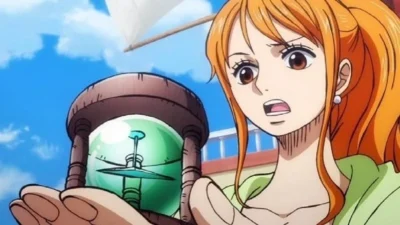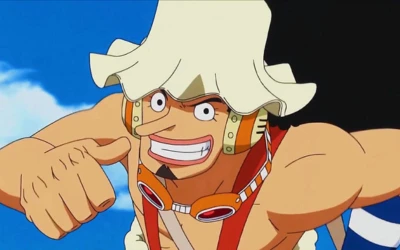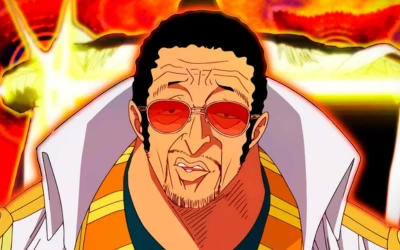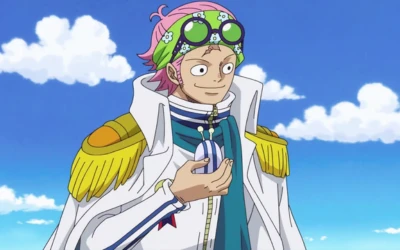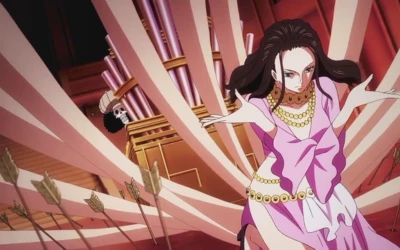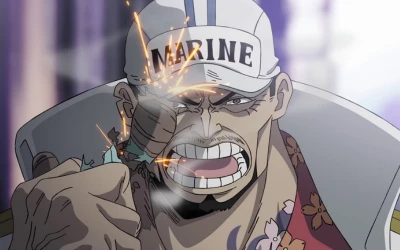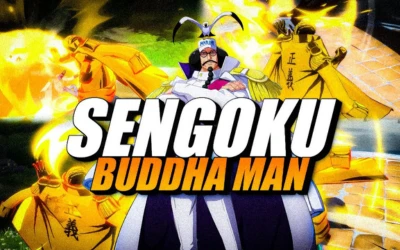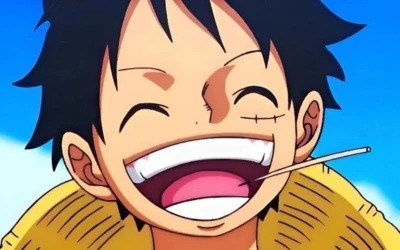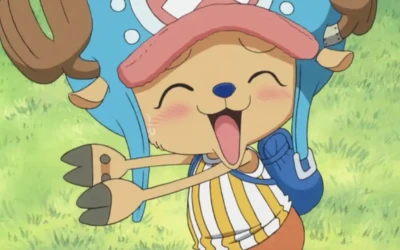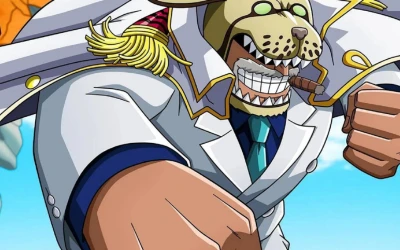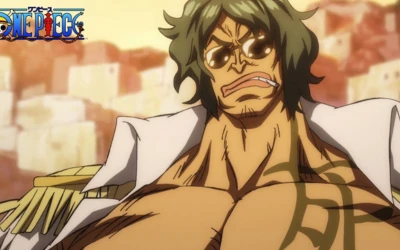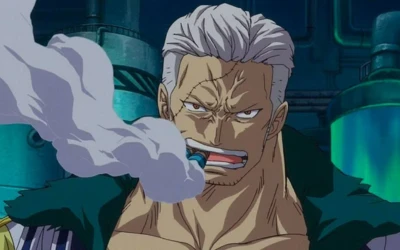There are characters in the vast and intricate world of anime and manga whose depth and complexity captivate audiences all over the globe. Among these figures, Issho, also known as Fujitora, stands out as a Marine Admiral who wields power and authority in the pursuit of law and order. His journey and role in the One Piece universe reveal layers of moral dilemma, personal struggles, and committed determination.
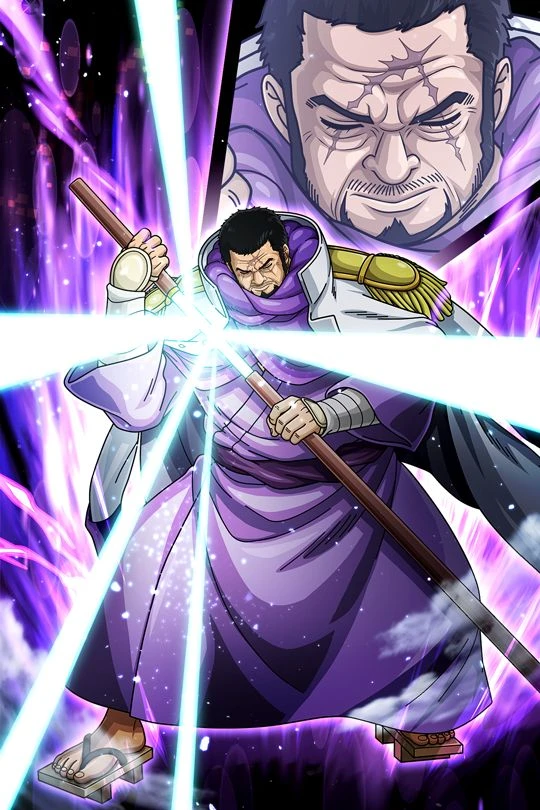
Introduction
a. Issho, also known as Fujitora, is an Admiral in the Marines
Admirals are at the top of the Marine Corps’ hierarchical structure in terms of authority and strength. Issho, also known as Fujitora, is respected and feared by both allies and adversaries. His presence represents not only formidable martial prowess, but also a firm commitment to upholding the principles of justice and righteousness.
Fujitora’s background is shrouded in mystery, lending intrigue to his character. Despite the ambiguity of his origins, Fujitora’s actions and beliefs reveal much about his character. He embodies the Marines’ ethos, which is motivated by a sense of duty to protect the innocent and enforce the law.
Fujitora’s service as an Admiral demonstrates his strategic brilliance and tactical acumen on the battlefield. Whether confronting notorious pirates or navigating political intrigue within the World Government, he demonstrates a deep understanding of the complexities of his role. His approach to justice is multifaceted, combining pragmatism with a firm commitment to moral principles.
However, Fujitora’s dedication to justice is not without internal conflict. As he confronts the harsh realities of the world and the ambiguity of morality, he wrestles with the consequences of his decisions. His character arc is a poignant examination of the complexities of power and responsibility, challenging conventional notions of heroism and villainy.
Despite the difficulties he faces, Fujitora remains a loyal supporter of justice, wielding his authority with humility and compassion. His experience in the Marines demonstrates the enduring power of conviction and the resilience of the human spirit.
b. He was conscripted through a World Military Draft during the two-year timeskip
The world underwent significant upheaval and transformation during the tumultuous events of the One Piece narrative’s two-year timeskip. Among these changes was the implementation of a World Military Draft, a comprehensive initiative aimed at increasing the ranks of various military organizations around the world.
Fujitora’s participation in the World Military Draft emphasizes the global scope of the conflicts raging in the One Piece world. As a figure of significant influence and power, his conscription emphasizes the magnitude of the world’s threats and the urgent need for coordinated action to combat them.
Fujitora’s decision to join the Marines through the World Military Draft is a continuation of his commitment to justice and order. Despite the inherent risks and challenges of military service, he accepts his responsibility to protect the innocent and uphold the principles of justice.
The World Military Draft acts as a catalyst for Fujitora’s journey, propelling him into new areas of conflict and intrigue. As he navigates the complexities of global politics and faces powerful adversaries, he remains loyal in his commitment to defending the weak and confronting terror wherever it appears.
Fujitora’s participation in the World Military Draft provides insight into the larger dynamics at work in the One Piece universe. The merging of disparate factions and ideologies demonstrates the interconnected nature of global conflicts, emphasizing the importance of cooperation and unity in the face of adversity.
Finally, Fujitora’s recruitment through the World Military Draft demonstrates his unwavering commitment to his principles and willingness to risk everything in the pursuit of justice.
Role and Actions
Issho, also known as Fujitora, appears in the popular manga and anime series One Piece. He is an Admiral in the Marine Corps, making him one of the organization’s most senior officers. Throughout the series, Issho has been involved in a number of significant events and has had a significant impact on the plot.
a. Appointed to fill the Admiral vacancies caused by Kuzan’s resignation and Sakazuki’s promotion
Following Admiral Kuzan’s resignation and Sakazuki’s promotion to Fleet Admiral, there were vacancies among the Admirals. Issho was chosen to fill one of these vacancies, demonstrating the Marines’ leadership’s trust and confidence in his abilities. This appointment also marked a shift in power dynamics within the organization, with Issho bringing his own distinct perspective and approach to his new role.
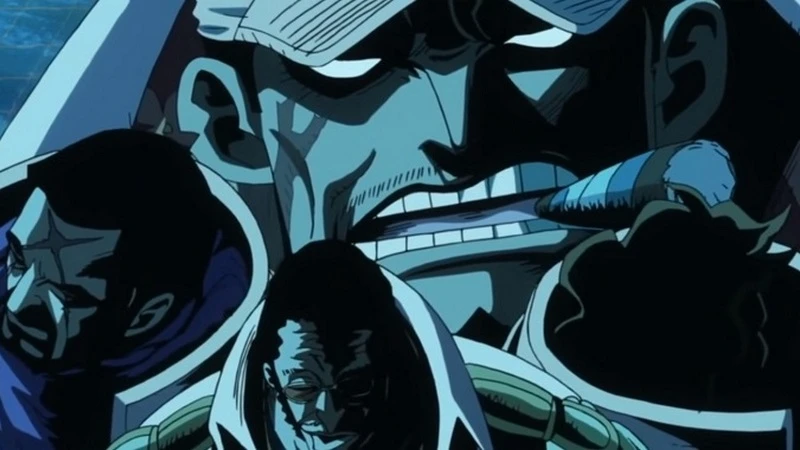
As an Admiral, Issho is responsible for upholding justice and maintaining order in the world of One Piece. His appointment to this prestigious position demonstrates his abilities as a Marine officer and commitment to serving the greater good. Throughout his career as an Admiral, Issho has demonstrated a dedication to his duties, frequently going to great lengths to achieve his objectives and uphold justice.
Issho’s presence as an Admiral has had far-reaching consequences for the One Piece universe, as his actions and decisions have significantly influenced the course of events. Whether confronting powerful pirates or challenging the status quo within the Marine Corps, Issho has proven to be a formidable force to be reckoned with.
Issho’s appointment as Admiral marked a new chapter in his life, full of challenges and opportunities to make a difference in the world. Issho’s role in the One Piece story will undoubtedly remain pivotal as long as he fulfills his duties and upholds justice.
b. Lead a campaign for the abolishment of the “Seven Warlords of the Sea” system
One of Issho’s most notable actions as Admiral was his campaign to end the “Seven Warlords of the Sea” system. The Warlords were a group of powerful pirates who had received amnesty from the World Government in exchange for their services. However, Issho believed that this system was incorrect and would ultimately harm the pursuit of justice.
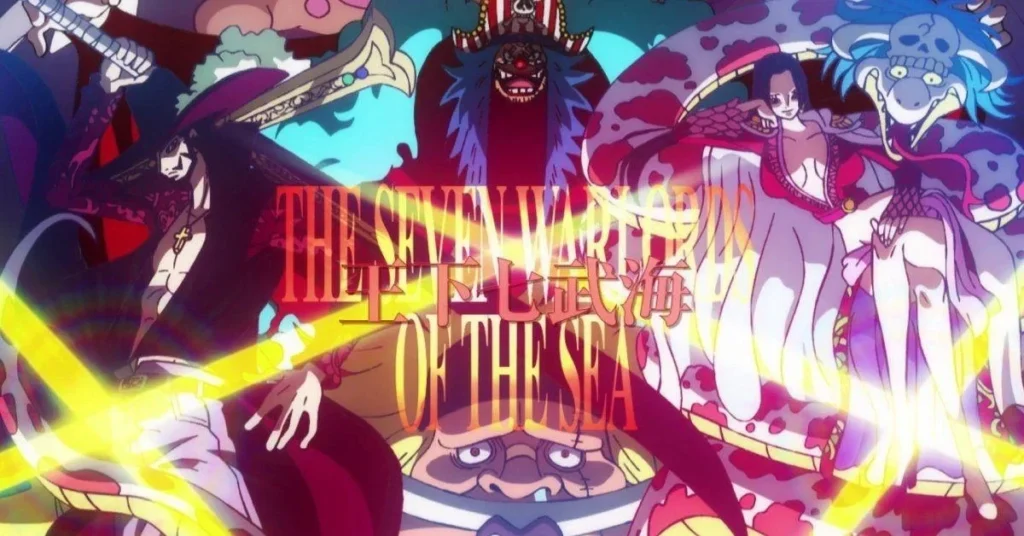
Issho’s campaign to abolish the Warlord system was motivated by his belief that it enabled dangerous criminals to operate freely under the appearance of government sanction. He argued that the Warlords frequently abused their power, causing more harm than good and undermining the Marines’ efforts to maintain order and justice.
To accomplish his goal, Issho took bold and decisive action, publicly challenging the Warlords and exposing their crimes to the world. His efforts drew widespread attention and support, as many people began to question the legitimacy of the Warlord system and demanded its revocation.
Despite opposition from powerful figures in the World Government and the Marines, Issho persisted in his pursuit of justice. He was willing to endanger his reputation and career to do what he thought was right, earning him the respect and admiration of many.
Issho’s campaign was ultimately successful, resulting in the abolition of the Warlord system. His actions had a significant impact on the world of One Piece, reshaping the balance of power and accompanying a new era of justice and accountability.
Issho’s role in spearheading the campaign to abolish the Warlord system solidified his reputation as a principled and determined Marine leader. His actions demonstrated his unwavering commitment to justice and standing up for what he believed in, transforming him into a formidable force for change in the One Piece universe.
c. Secondary antagonist of the Dressrosa Arc
During the Dressrosa Arc, Issho was a secondary antagonist, despite one with complex motivations and moral ambiguities. During this arc, his primary goal was to apprehend the Straw Hat Pirates and their allies, who had become involved in the conflict on the island of Dressrosa.
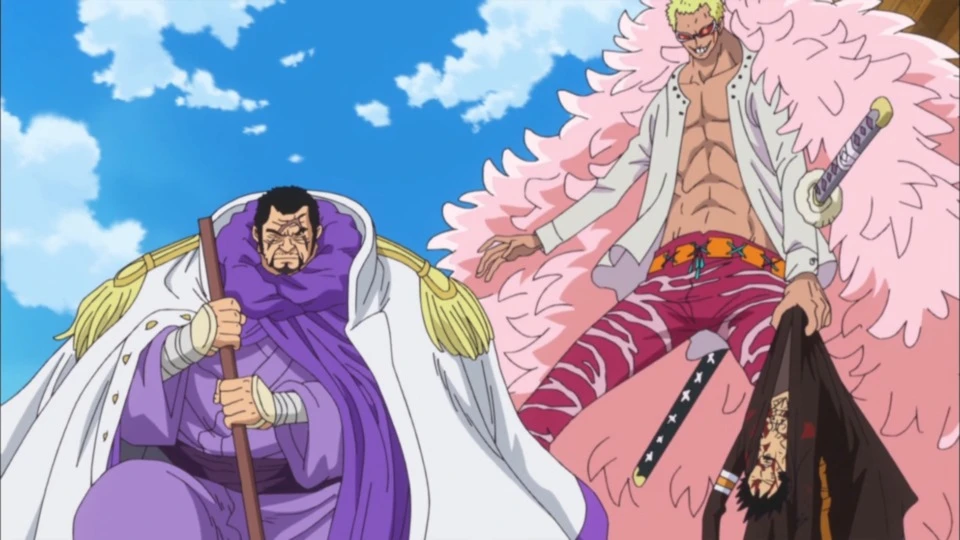
Despite his Admiral status and commitment to justice, Issho found himself at odds with the Straw Hat Pirates and their allies over their involvement in the overthrow of Dressrosa’s corrupt ruler, Donquixote Doflamingo. Issho perceived the Straw Hats’ actions as a threat to the stability of the world order and felt compelled to intervene.
Throughout the arc, Issho demonstrated his formidable combat skills, utilizing his gravity-based Devil Fruit powers to devastating effect on his opponents. He fought fierce battles with several key characters, including Monkey D. Luffy and Trafalgar Law, demonstrating his determination to capture them at any cost.
Despite his antagonistic role, Issho’s actions during the Dressrosa Arc were not all malicious. He acted with honor and integrity, refusing to ignore the atrocities committed by Doflamingo and his subordinates. Issho’s conflicted personality adds depth to his character and made him an engaging antagonist.
Finally, Issho’s role in the Dressrosa Arc brought to light the complexities of justice and morality in One Piece’s world. While he persisted in his pursuit of the Straw Hat Pirates, his actions were motivated by a sense of duty rather than pure evil. This nuanced portrayal established Issho as a memorable and intriguing character in the series.
d. Notable for being the first Admiral to appear post-timeskip
Issho is the first Admiral to appear in the One Piece series after the two-year time skip. His introduction was a pivotal moment in the story because it gave fans their first glimpse of the changes that had occurred in the world during the time skip.
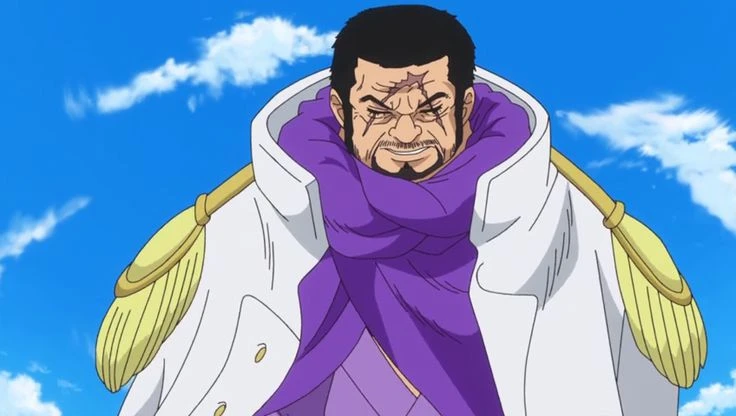
When Issho made his debut, he made an immediate impression with his distinct appearance and commanding presence. His blindfold and calm demeanor stood out from the more traditional portrayals of Marine Admirals, hinting at his distinct personality and approach to justice.
As the first Admiral to appear after the time skip, Issho was instrumental in establishing the tone for the new era of One Piece. His actions and decisions had far-reaching consequences, influencing the course of events and laying the groundwork for subsequent storylines.
Issho’s introduction also highlighted the evolution of the series’ characters and world-building. The time jump allowed for significant development and growth among the main characters, as well as changes in the political landscape of the One Piece universe. Issho’s introduction as a new Admiral helped to highlight these changes and establish the series’ current state of affairs.
Overall, Issho’s role as the first Admiral to appear post-timeskip added depth and intrigue to the One Piece story. His introduction marked the beginning of a new chapter in the series, laying the groundwork for the exciting adventures and challenges that the Straw Hat Pirates and their allies would face.
Appearance
a. Blind with only the whites of his eyes showing
Issho, also known as Admiral Fujitora, has a distinctive and striking appearance. One of the most distinguishing features of his appearance is his blindness, as evidenced by the fact that only the whites of his eyes are visible. Despite his lack of sight, Issho is a highly skilled and formidable opponent who can hold his own against powerful opponents. His blindness adds mystery and intrigue to his character, raising questions about how he navigates and fights with such precision.
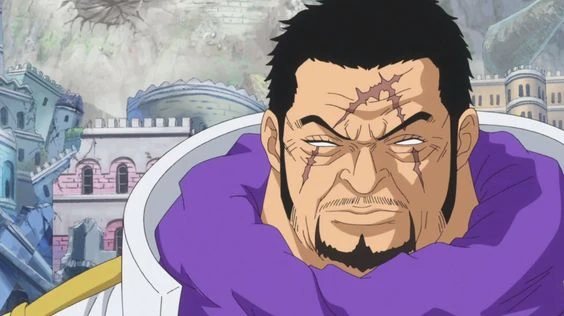
Issho’s blindness also represents his commitment to justice and unwavering dedication to upholding the Marine organization’s principles. Despite facing challenges and obstacles as a result of his disability, Issho refuses to let them interfere with his ability to perform his duties as an admiral. Instead, he relies on his other senses and sharp instincts to compensate for his lack of vision, demonstrating remarkable resilience and determination in the face of adversity.
b. X-shaped scar on the left side of his forehead, self-inflicted
Issho’s enigmatic appearance is highlighted by an X-shaped scar on the left side of his forehead. What makes this scar especially intriguing is that it was self-inflicted, implying a significant backstory or personal struggle that drove Issho to mark himself in such a way.
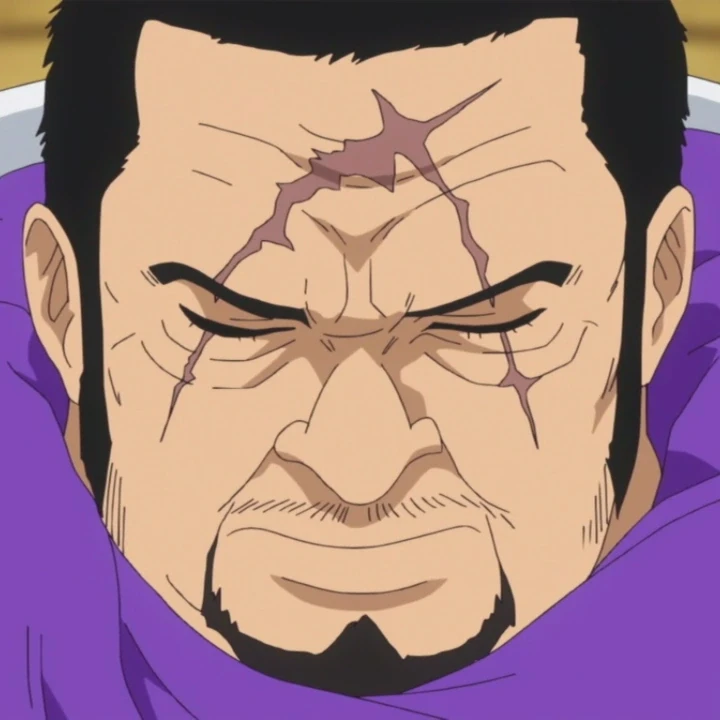
The scar suggests that Issho has had a stormy past, filled with challenges, conflicts, and possibly even moments of self-reflection and internal strife. It serves as a constant reminder of his past experiences and decisions, which add depth and complexity to his character.
While the exact circumstances surrounding the scar remains unknown, its presence indicates that Issho has endured hardships and trials that have left an indelible mark on him. It also demonstrates his resilience and determination to overcome adversity, as evidenced by his promotion to admiral despite any challenges he may have faced along the way.
c. Wears a Marine coat with personal clothes underneath, opting for a yukata and cloak
Issho is well-known for his distinct physical features as well as his unique fashion sense. While he wears the standard Marine coat appropriate for his rank as an admiral, he adds his own flair to his attire by wearing personal clothing underneath. One of his favorite outfits is a traditional Japanese yukata, a casual kimono-style garment commonly worn at summer festivals or other relaxed events.
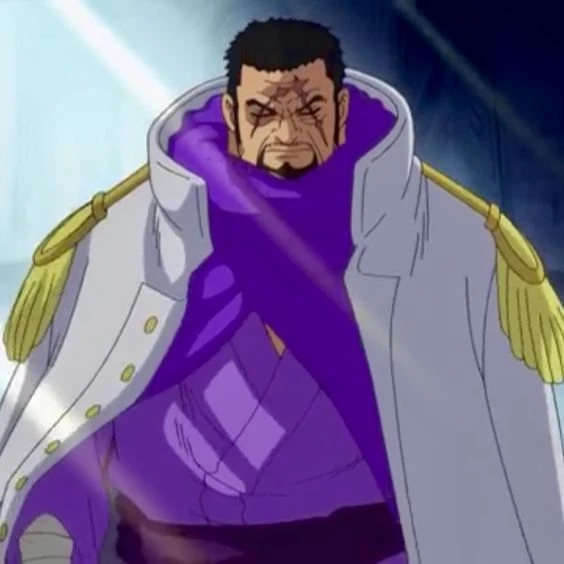
This attire reflects Issho’s cultural background and personal preferences, adding a touch of personality to his otherwise formal appearance as a Marine officer. It also demonstrates his respect for tradition and willingness to embrace his heritage, despite his role in a strictly controlled organization like the Marines.
To complete his look, Issho frequently wears a cloak over his Marine coat, emphasizing his distinct style and lending an air of mystery to his presence. The combination of traditional Japanese attire and a Marine admiral’s formal uniform gives Issho a visually striking and memorable appearance, cementing his status as a standout character in the One Piece universe.
d. Wields a shikomizue (Japanese swordstick) and wears geta sandals
Issho’s choice of weapons and footwear adds to his distinct and intriguing personality. Instead of a traditional sword or firearm, as many other Marine officers do, Issho carries a shikomizue, a Japanese swordstick concealed within a cane-like sheath. This unconventional weapon reflects Issho’s preference for delicacy and finesse in combat, allowing him to surprise opponents with unexpected strikes and actions.
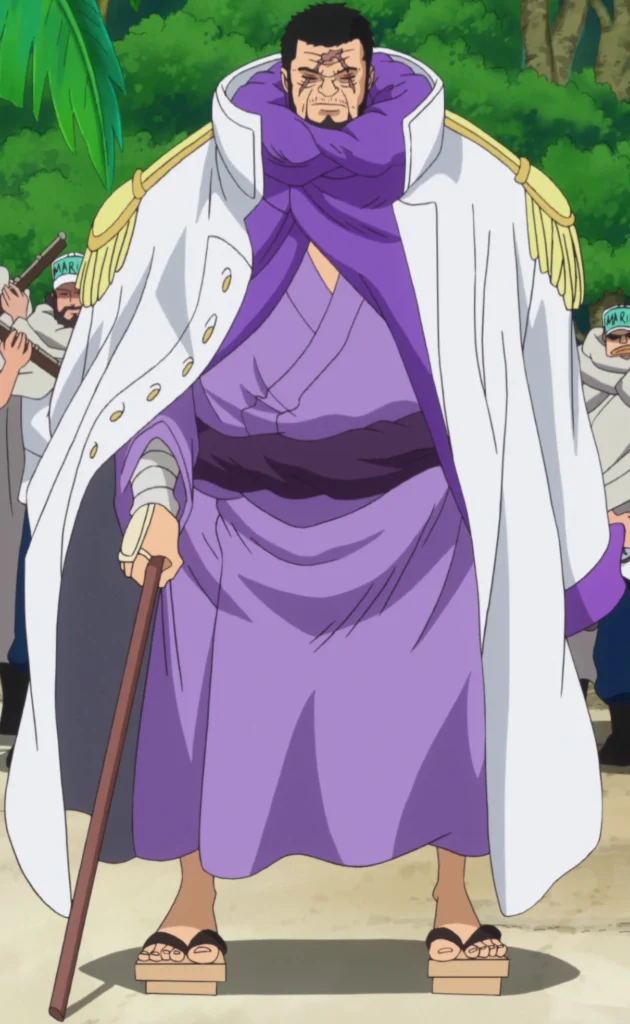
The shikomizue also complements Issho’s overall aesthetic, blending in with his traditional Japanese attire and contributing to his image as a skilled and mysterious warrior. Its versatility and discreet nature make it an ideal choice for a Marine admiral who prefers strategy and precision over brute force.
In addition to his weapon, Issho is frequently seen wearing geta sandals, which are traditional Japanese wooden footwear with elevated wooden soles. While not typically associated with military attire, Issho’s use of geta sandals emphasizes his cultural roots and adds authenticity to his overall appearance.
Personality
a. Advocate of “Humane Justice”, prioritizing protecting people and preventing misfortune
Issho, also known as Fujitora, is a trusty supporter of the concept of “Humane Justice.” This philosophy places a high value on protecting innocent lives and avoiding unnecessary suffering. As a senior member of the Marine Corps, Issho believes in using his authority and power for the greater good, rather than simply enforcing the law without regard for the human cost.
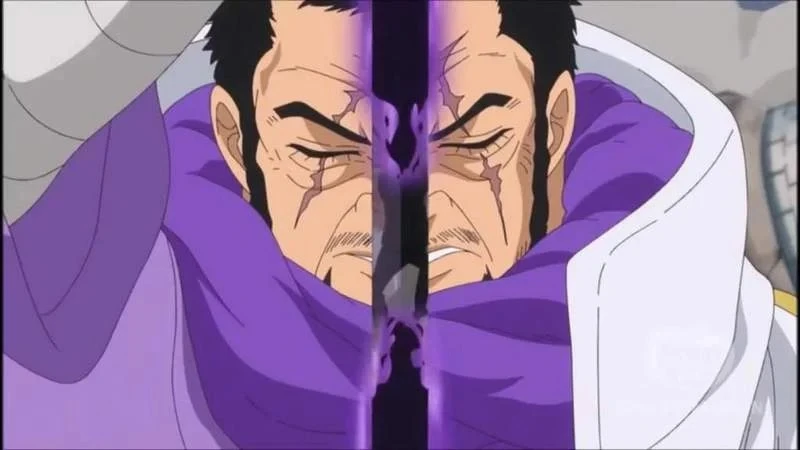
Issho’s actions and decisions reflect his commitment to humane justice. He prioritizes civilians’ safety and well-being above all else, frequently putting himself in danger to ensure their protection. This commitment to serving the people sets him apart from other Marines who may prioritize upholding the law regardless of its impact on individuals.
Furthermore, Issho’s perspective on justice is characterized by empathy and compassion. He understands the complexities of human nature and realizes that not all crimes are committed with malicious intent. Instead of taking drastic measures, Issho strives to understand the underlying causes of wrongdoing and address them in a way that promotes healing and reuniting.
Overall, Issho’s commitment to “Humane Justice” distinguishes him as a principled and compassionate Marine leader. His unwavering commitment to protecting people and preventing misfortune shines as a beacon in a world full of conflict and uncertainty.
b. Desires to eliminate evil, rooting out corruption within the Marines and World Government
In addition to his commitment to human justice, Issho has a strong desire to eradicate evil and corruption within the Marine Corps and the World Government. He understands that systemic corruption and abuse of power can undermine the very institutions designed to uphold justice and protect the public.
Issho’s determination to combat evil and corruption is evident in his actions as a Marine Admiral. He is not afraid to question authority or confront those who use their positions for personal gain. Unlike some of his colleagues, who may ignore wrongdoing, Issho actively seeks opportunities to expose and punish corrupt individuals, regardless of rank or status.
Furthermore, Issho’s efforts to combat corruption go beyond the confines of the Marine organization. He is well aware of the impact that corrupt members of the World Government can have on global affairs, and he is determined to hold them accountable for their actions.
Issho’s anti-corruption stance puts him at odds with some of his fellow Marines and government officials, who may profit from the status quo. However, he remains convinced that true justice cannot be achieved until corruption is eradicated at all levels of society.
Overall, Issho’s determination to eradicate evil and corruption within the Marine Corps and the World Government demonstrates his unwavering dedication to the principles of justice and integrity.
c. Humble and responsible, willing to accept blame and apologize for mistakes
One of Issho’s most admirable characteristics is his modesty and sense of responsibility. Despite his position of great power and authority as a Marine Admiral, Issho remains humble and approachable. He does not let his rank or status inflate his ego, preferring to treat others with respect and humbleness.
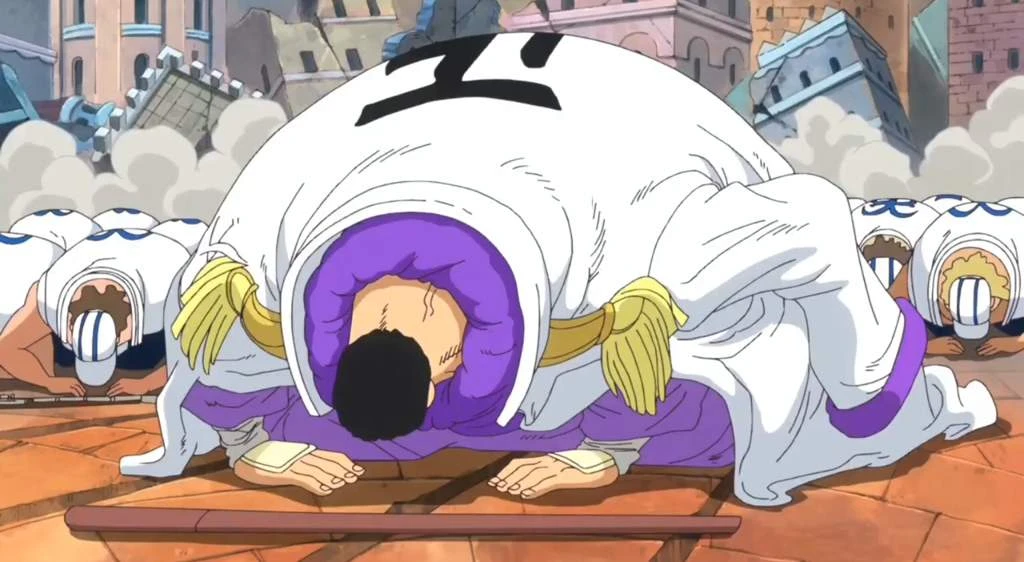
Furthermore, Issho isn’t afraid to admit his mistakes. Unlike some leaders who seek to shift blame or deny wrongdoing, Issho accepts full responsibility for his actions and is willing to apologize when necessary. This willingness to admit and learn from his mistakes sets a good example for those under his command and promotes a culture of accountability within the Marine Corps.
Issho’s modesty and sense of responsibility extend beyond his personal behavior into his leadership style. He values his subordinates’ feedback and encourages open communication and collaboration. By creating an environment in which everyone feels valued and respected, Issho encourage a sense of unity and unity among Marines.
Overall, Issho’s humbleness, sense of responsibility, and willingness to accept blame and apologize for mistakes show that he is committed to being a principled and accountable Marine leader.
d. Pragmatic, willing to align with opposing parties for the greater good
In addition to his other qualities, Issho is known for his pragmatic approach and willingness to collaborate with opposing parties for the greater good. While Issho remains unwavering in his commitment to justice and integrity, he recognizes that achieving positive results frequently necessitates compromise and collaboration.
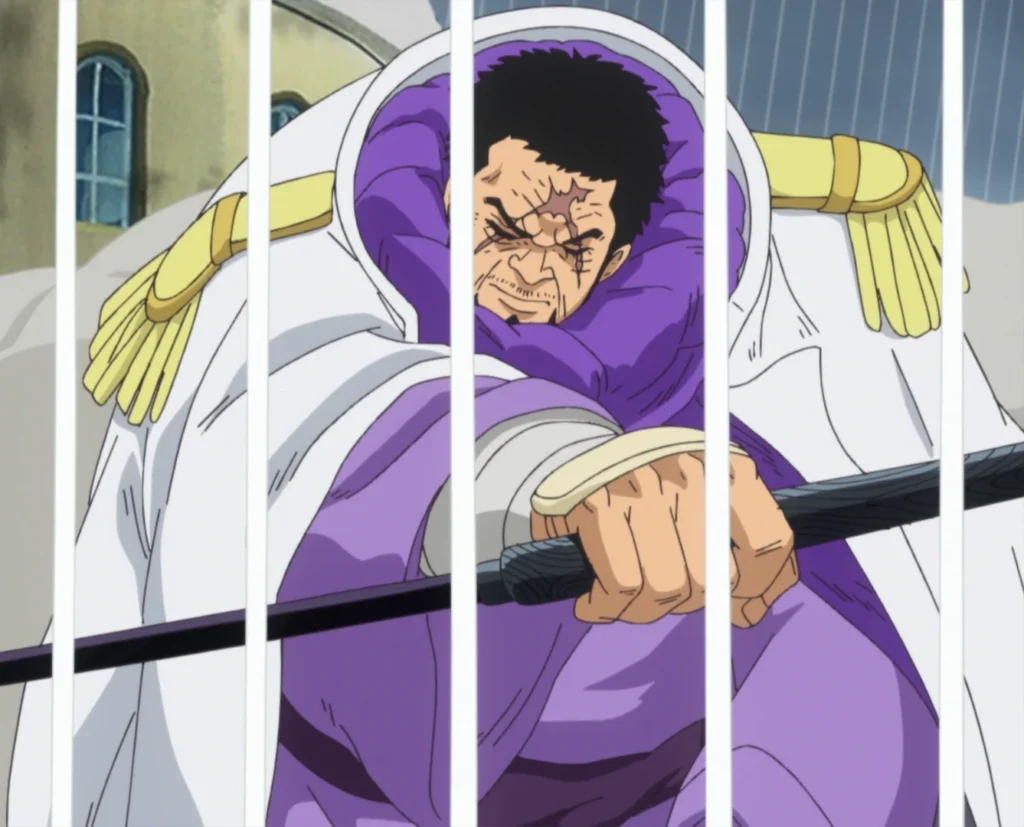
Issho’s pragmatism is reflected in his approach to conflict resolution and diplomacy. Rather than using force or aggression as a first resort, he prefers peaceful solutions whenever possible. This pragmatic approach enables him to avoid unnecessary violence and promote mutual understanding among opposing parties.
Furthermore, Issho is not afraid to put aside personal differences and collaborate with people or groups who may have opposing interests. He understands that achieving common goals frequently necessitates setting aside differences and focusing on shared objectives. By forming alliances and coalitions, Issho can better hold collective strength and resources to tackle complex challenges.
Issho’s willingness to work with opposing parties for the greater good distinguishes him as a practical and forward-thinking Marine leader. His ability to navigate complex political landscapes and reach agreements demonstrates his dedication to achieving positive results for the greater good, even in the face of adversity.
Overall, Issho’s pragmatism and willingness to collaborate with opposing parties demonstrate his effectiveness as a leader and his commitment to pursuing justice and peace in a volatile world.
Relationships
a. Respectful within the Marines, deeply respected by subordinates
Issho, also known as Admiral Fujitora, exemplifies the Marines’ hierarchical structure and values of respect and discipline. As a high-ranking officer, he wields authority and expects obedience from his subordinates. However, what distinguishes Issho is his approachability and fairness with those under his command.
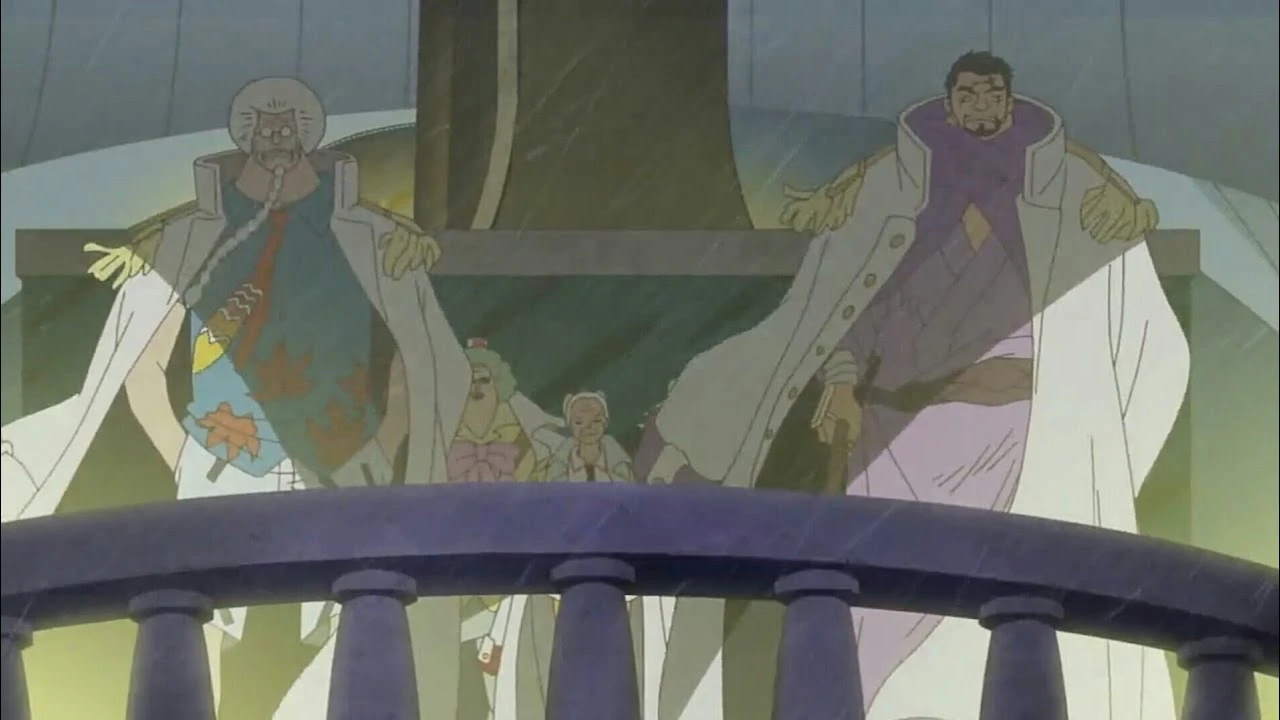
Issho believes in leading by example and sets high standards for himself and others. He promotes a culture of mutual respect among Marines, in which rank is not the sole determinant of worth or competence. Instead, he prioritizes competence, dedication, and integrity, regardless of rank or background.
Subordinates under his leadership feel empowered to express their opinions and concerns, knowing that they will be heard and taken into consideration. Issho encourages open communication and promote a sense of community among its members. This brings upa positive work environment in which employees can develop and excel in their positions.
His subordinates hold him in high regard and admiration due to his respectful demeanor and leadership. They trust him completely and are eager to follow his lead, knowing that he has their best interests at heart. Issho’s ability to command respect while remaining approachable and compassionate distinguishes him as a truly exceptional leader within the Marine Corps.
b. Trusted by Fleet Admiral Sakazuki but has tense moments due to conflicting values
As one of the Marines’ highest-ranking officers, Issho commands the respect and trust of Fleet Admiral Sakazuki, also known as Akainu. Sakazuki acknowledges Issho’s competence and commitment to ensuring justice within the organization. Despite their trust, the two experience moments of tension due to their opposing values and approaches to justice.
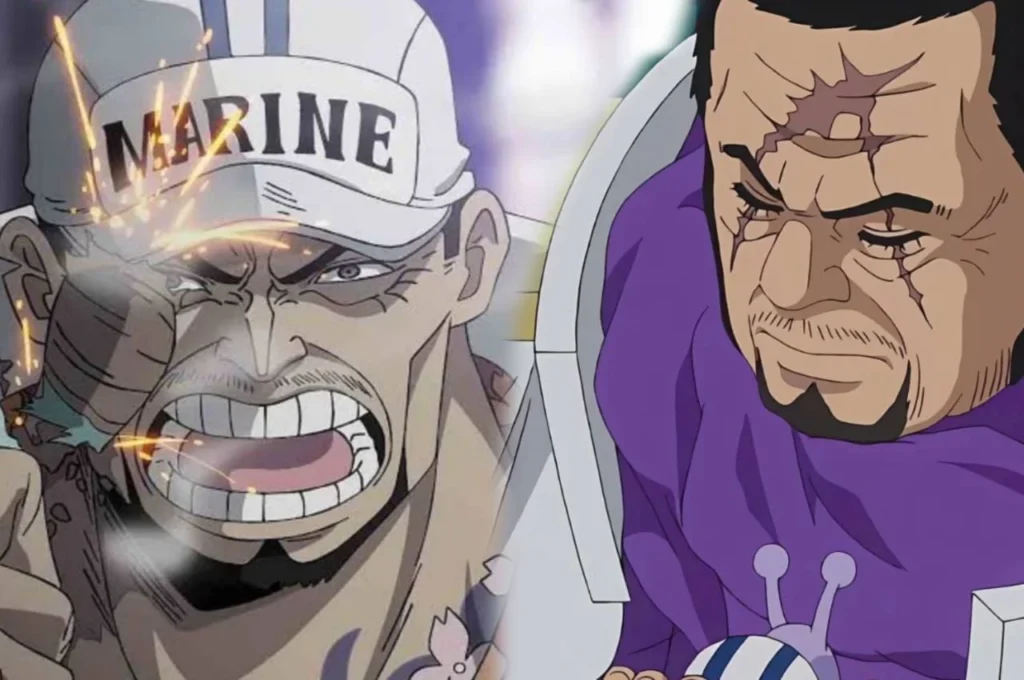
Sakazuki, known for his unwavering commitment to absolute justice, frequently clashes with Issho’s more delicate and practical approach. While Sakazuki believes in eradicating all forms of evil without exception, Issho prefers moral relativism, recognizing that situations are not always black and white.
These ideological differences result in occasional disagreements between Issho and Sakazuki, particularly over strategy and decision-making. Sakazuki’s strict adherence to absolute justice can occasionally clash with Issho’s more adaptable and compassionate approach, resulting in tense moments of conflict.
Despite their differences, Sakazuki ultimately trusts Issho’s judgment and values his contributions to the Marines. Issho, in turn, respects Sakazuki’s authority as Fleet Admiral and strives to work within the organization’s hierarchy while remaining true to his own principles.
Their relationship is marked by a delicate balance of mutual respect and occasional tension, as each Admiral navigates their own interpretation of justice in the complex world of the Marine Corps.
c. Close to Smoker and Sengoku, amicable towards each other
Within the Marines, Issho is close to two prominent figures: Vice Admiral Smoker and former Fleet Admiral Sengoku. Despite their differences in rank and experience, the three individuals have a mutual respect and camaraderie that extends beyond their professional roles.
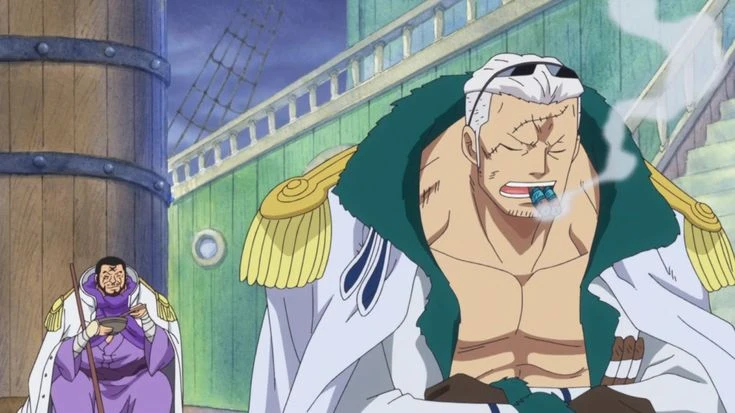
Smoker, known for his strong sense of justice and determination, discovers a connected spirit in Issho. Both men are determined to uphold the principles of justice and righteousness, albeit in different ways. While Smoker may hold a more traditional view of justice, Issho’s pragmatism and empathy complement his ideals, resulting in a strong partnership based on mutual understanding and respect.
Similarly, Issho has a high regard for Sengoku, the former Fleet Admiral renowned for his wisdom and leadership. Sengoku’s years of experience and strategic insight make him an invaluable mentor and advisor to Issho, who relies on him for advice and wisdom as he navigates the complexities of the Marine Corps.
Despite their differing approaches and perspectives, the trio maintains a harmonious relationship built on mutual trust and respect. They support each other in their respective roles within the Marine Corps, offering advice and encouragement as needed.
Their bond exemplifies the power of mutual respect and understanding in building strong relationships within an organization, demonstrating that true camaraderie can thrive even in a hierarchical structure like the Marines.
d. Interaction with Ryokugyu shows mutual respect despite differing views
Another notable relationship among Marines is Issho’s interaction with Admiral Ryokugyu. Despite their opposing viewpoints and approaches to justice, the two Admirals have mutual respect for each other’s abilities and commitment to duty.
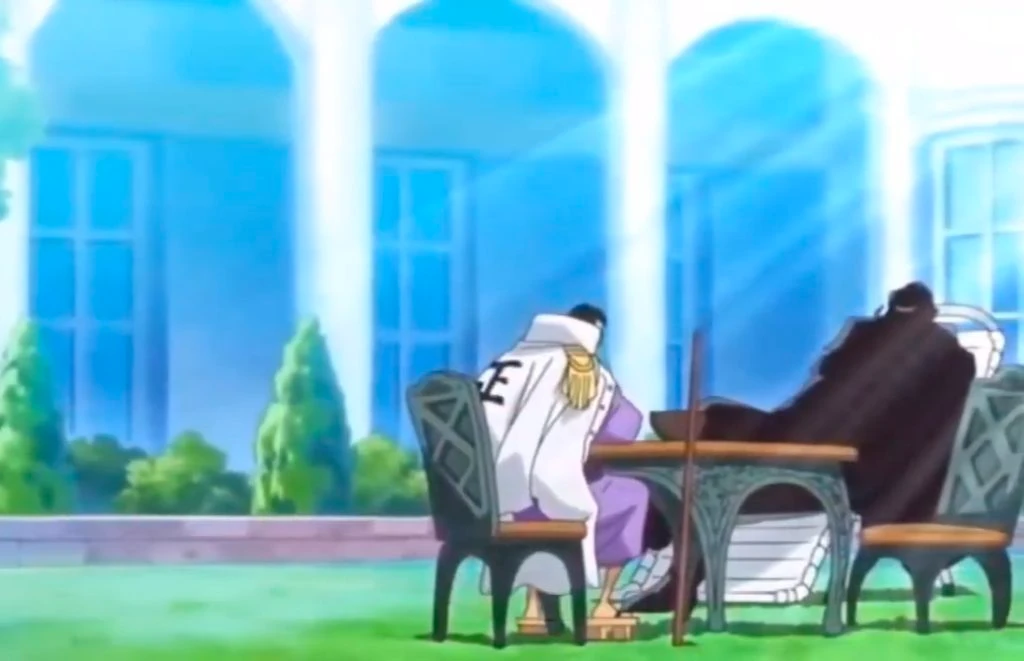
Ryokugyu, known for his enigmatic personality and unconventional methods, frequently disagrees with Issho on matters of strategy and ideology. While Issho advocates for a more pragmatic and empathetic approach to justice, Ryokugyu remains a firm believer in the role of strength and power in maintaining order.
Despite their differences, Issho and Ryokugyu acknowledge each other’s strengths and abilities. They may not always agree, but they value each other’s convictions and dedication to their principles. Their interactions are marked by mutual respect for each other’s expertise and a willingness to engage in constructive dialogue, even when they disagree.
This mutual respect serves as the foundation for their professional relationship within the Marine Corps, allowing them to collaborate effectively despite their opposing views. While they may disagree, they ultimately share the same goal of upholding justice and protecting the people they serve.
Their relationship emphasizes the importance of respecting diversity of thought and embracing opposing viewpoints within the organization, as it allows for a more overall approach to addressing the challenges that arise.
e. Disdainful of the World Government’s actions, willing to defy them
Despite his loyalty to the Marines, Issho has a strong dislike for the World Government’s actions and policies. He recognizes the flaws and corruption in the system and is not afraid to question its authority when he believes it is in the best interests of justice.
Issho’s willingness to defy the World Government’s orders and protocols demonstrates his unwavering dedication to his own sense of morality and justice. He refuses to ignore injustice, even if it means defying his superiors or the established order.
This resistance has frequently put Issho at odds with the World Government and its representatives, who regard him as a rebel or troublemaker. However, Issho remains devoted in his convictions, willing to face the consequences of his actions in order to defend what he believes is right.
Despite the risks, Issho’s resistance is a source of hope for those oppressed or marginalized by the World Government’s policies. His willingness to stand up for what is right inspires others to do the same, instilling a sense of rebellion and resistance within the Marine Corps and beyond.
Finally, Issho’s opposition of the World Government’s actions demonstrates his integrity and courage as a Marine. He refuses to give up his principles in the face of adversity, setting a shining example of what it means to uphold justice in a corrupt world.
Enemies and Allies
a. Opposes the Seven Warlords of the Sea system, believing they are untrustworthy
Fujitora, also known as Issho, is a high-ranking Marine Admiral who opposes the Seven Warlords of the Sea. He sees this system as fundamentally flawed and untrustworthy, and believes that granting amnesty to notorious pirates in exchange for their services undermines justice and encourages further criminal activity. Fujitora’s opposition to the Warlords demonstrates his commitment to upholding the principles of justice and accountability within the World Government.
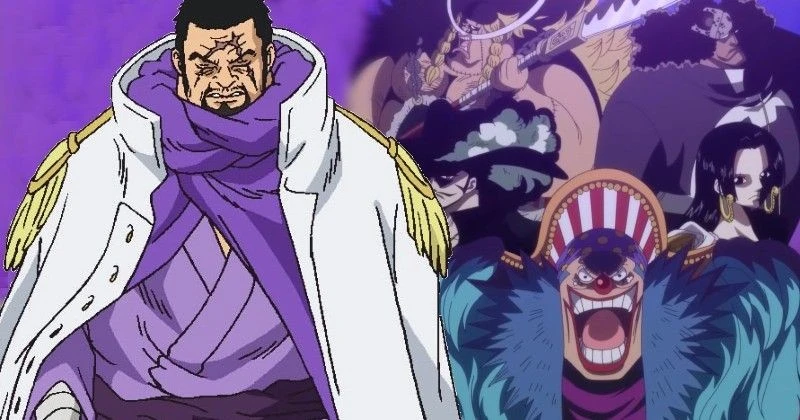
Fujitora’s distrust of the Warlords is reflected in his actions during the Dressrosa Arc, when he actively works to abolish the system entirely. Despite being a Marine, Fujitora’s willingness to question the status quo demonstrates his integrity and commitment to doing what is right, even if it means confronting powerful adversaries within his own organization.
As an Admiral, Fujitora wields significant authority and influence within the Marine Corps, allowing him to pursue his goal of abolishing the Warlord system with determination and resolve. His unwavering commitment to justice motivates his efforts to dismantle a system that he sees as fundamentally unsound and unjust.
b. Views pirates as enemies but acknowledges good deeds and intentions
While Fujitora persistently opposed to pirates because of their criminal activities and disruption of peace, he also has a fine understanding of their motivations and actions. Unlike some of his fellow Marines, who regard all pirates as hopeless enemies, Fujitora recognizes that not all pirates are inherently evil, and that some may have good intentions or commit commendable acts.
Throughout his interactions with pirates, Fujitora remains vigilant in his efforts to uphold the law and keep order. However, he acknowledges that pirates can act in ways that benefit society or individuals in need. This viewpoint reflects Fujitora’s dedication to justice, balanced with a sense of fairness and pragmatism.
Fujitora’s recognition of pirates’ potential for good is consistent with his overall philosophy of seeking balance and understanding in the pursuit of justice. While he remains vigilant against those who seek to disrupt the peace, he is also open-minded enough to recognize situations in which cooperation or understanding may be warranted, even with people who are commonly regarded as adversaries.
c. Conflicts with Doflamingo, distrustful of his motives and illegal activities
One of Fujitora’s most notable conflicts is with Donquixote Doflamingo, a former Warlord of the Sea and notorious pirate who wielded absolute power in the kingdom of Dressrosa. From the moment Fujitora arrives on Dressrosa, it is clear that he harbors deep distrust and suspicion for Doflamingo, viewing him as a dangerous criminal who must be apprehended.
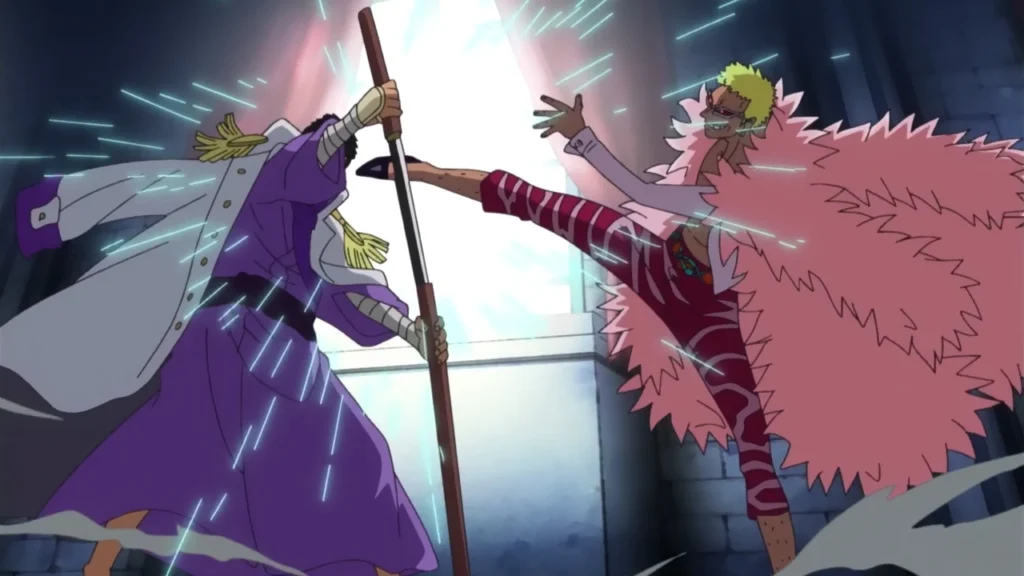
Fujitora distrusts Doflamingo because of his involvement in a variety of illegal activities, such as human trafficking, weapons smuggling, and manipulating entire nations for personal gain. As an Admiral sworn to uphold justice, Fujitora is determined to bring Doflamingo to justice and end his reign of terror.
Throughout the Dressrosa Arc, Fujitora clashes with Doflamingo and his associates, determined to bring down their criminal enterprise and free the people of Dressrosa from oppression. Despite facing formidable opposition, Fujitora remains loyal in his pursuit of justice, refusing to give up even in the face of overwhelming odds.
Fujitora’s conflict with Doflamingo demonstrates his unwavering commitment to justice and willingness to face powerful adversaries in the name of righteousness. Despite the dangers, Fujitora remains determined to hold criminals like Doflamingo accountable for their actions and ensure justice is served.
d. Engages with the Revolutionary Army but shows consideration and respect
In contrast to his confrontational approach to pirates and criminals, Fujitora’s interactions with the Revolutionary Army show a more nuanced side. While Fujitora sees the Revolutionary Army as a threat to the World Government’s stability, he also recognizes their grievances and hopes for a better world.
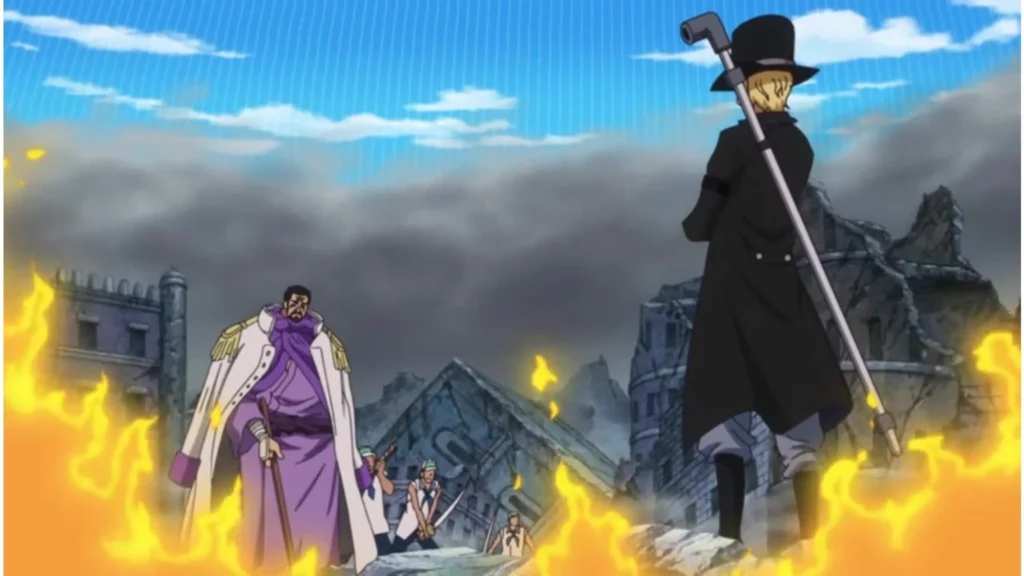
Throughout the series, Fujitora engages in dialogue with Revolutionary Army members, demonstrating consideration and respect for their beliefs and motivations. Despite being on opposing sides of the conflict, Fujitora is not blinded by hatred or prejudice for the Revolutionaries, but rather seeks to understand their point of view and address the root causes of their discontentment.
Fujitora’s willingness to work with the Revolutionary Army demonstrates his desire to find peaceful solutions to conflicts whenever possible. Rather than using violence or brute force, Fujitora seeks to promote dialogue and understanding among opposing group, recognizing that true justice can only be achieved through mutual respect and cooperation.
While Fujitora remains committed to the World Government and its ideals, he recognizes the system’s flaws and injustices, which makes him more open to new perspectives and solutions. His willingness to work with the Revolutionary Army demonstrates his dedication to justice and faith in the power of diplomacy and dialogue to resolve conflicts.
Issho Combat and Abilities
a. Utilizes gravity-based powers, capable of tremendous display of force
Fujitora, also known as Issho, has a unique and powerful combat style based on gravity manipulation. With his Devil Fruit ability, the Zushi Zushi no Mi, he has remarkable control over gravitational forces, giving him enormous power on the battlefield. This ability enables him to manipulate objects and people with ease, adjusting their weight and trajectory as needed.
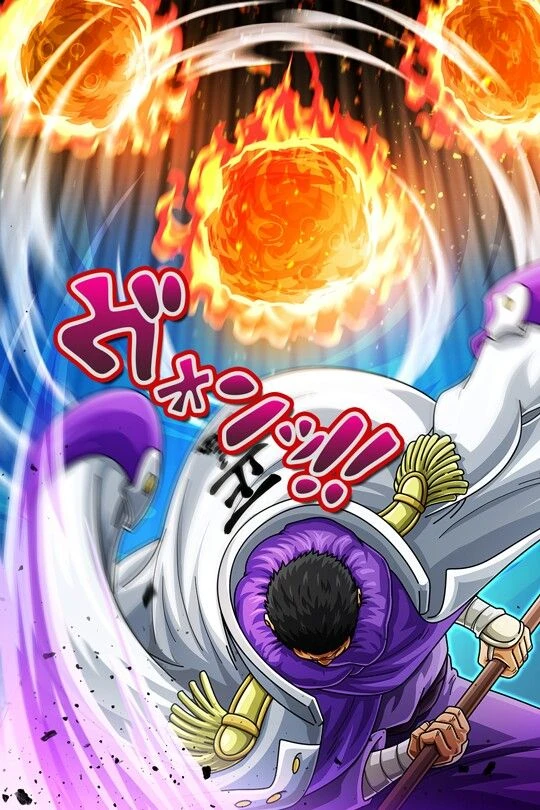
In combat, Fujitora demonstrates his command of gravity by unleashing devastating attacks that can crush opponents with overwhelming force. From creating gravitational fields to attract or repel objects, to float massive structures and hurling them at his enemies, he uses a wide range of techniques to gain an advantage in battle.
Despite the enormous destructive potential of his gravity-based abilities, Fujitora usually exercises restraint, preferring to use them only when absolutely necessary. He recognizes the responsibility that comes with such incredible abilities and strives to minimize collateral damage whenever possible. However, when confronted with formidable adversaries who endanger the safety of others, he does not hesitate to use all of his power to defend those in need.
b. Prefers to avoid collateral damage but can be relentless against opponents
Fujitora’s approach to combat reflects his sense of fairness and compassion. While he strives to minimize collateral damage and protect innocent lives, he is not afraid to confront opponents who pose a significant threat. His dedication to justice compels him to confront wrongdoers head on, even if it means fighting fierce battles that test his resolve.
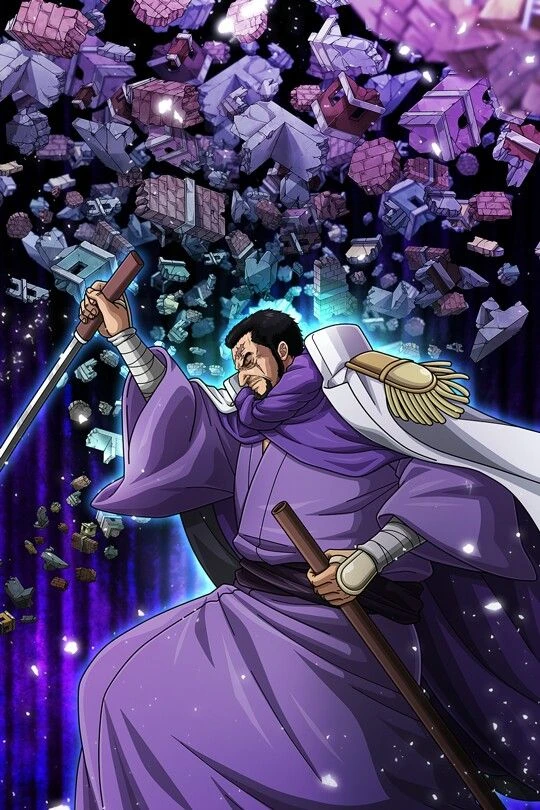
Despite his formidable abilities, Fujitora maintains discipline and composure in the heat of battle. He approaches each confrontation strategically, carefully assessing his opponent’s strengths and weaknesses before devising an attack strategy. His calm demeanor enables him to stay focused and adapt to changing circumstances, making him a formidable opponent on the battlefield.
Fujitora’s determination to uphold justice and protect the innocent drives his relentless pursuit of those who wish to harm others. He is willing to go above and beyond to ensure justice is served, no matter the personal cost. His unwavering dedication to his principles makes him both a formidable adversary and a respected ally in the ongoing fight for peace and justice.
c. Skilled in combat, maintains composure even in chaotic situations
Fujitora’s extensive training and experience have sharpened his combat abilities to a razor’s edge. As a senior admiral in the Marine Corps, he has faced numerous challenges and adversaries throughout his career, allowing him to develop a formidable fighting style that is both efficient and effective.
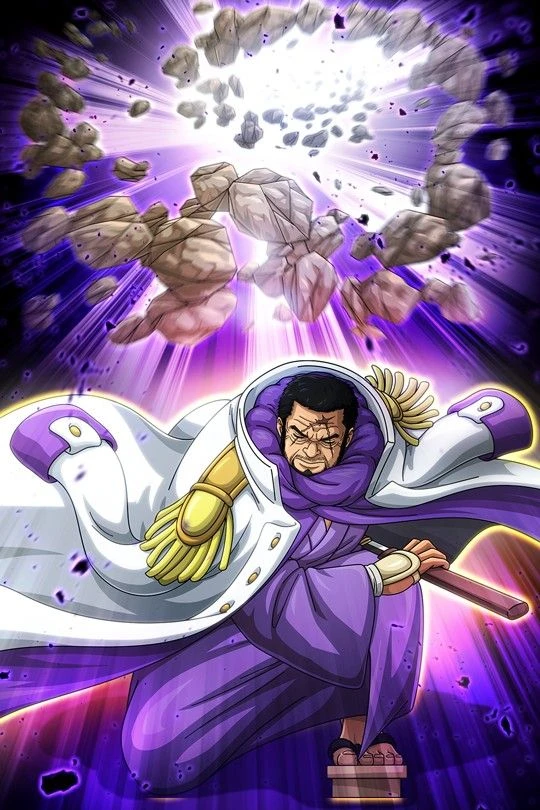
One of Fujitora’s most distinguishing characteristics is his ability to remain calm and collected even in the most chaotic and intense situations. Whether he is fighting powerful opponents or navigating the chaos of a battlefield, he maintains a calm and collected demeanor that allows him to make sound decisions and react quickly to changing circumstances.
Fujitora’s combat style is versatile and deadly, combining his mastery of gravity-based powers with advanced martial arts techniques. He seamlessly combines hand-to-hand combat with his Devil Fruit abilities, using precise strikes and well-timed activity to gain an advantage over his opponents.
Despite his formidable combat skills, Fujitora does not rely solely on his own abilities. He understands the importance of teamwork and cooperation, frequently collaborating with his fellow Marines and allies to achieve their goals and defeat formidable foes. His leadership abilities and tactical acumen make him a respected figure among Marines and a formidable force on the battlefield.
Devil Fruit and Haki Abilities
a. Fujitora consumed the Zushi Zushi no Mi
Fujitora, also known as Issho, is a senior Marine Admiral with incredible Devil Fruit abilities. He ingested the Zushi Zushi no Mi, a Paramecia-type Devil Fruit that enables him to control gravitational forces at will. Fujitora can use this ability to control gravity in a variety of ways, including attracting and repelling objects with incredible force. This gives him a significant advantage in combat because he can manipulate the battlefield by adjusting the gravitational pull of objects and people around him.
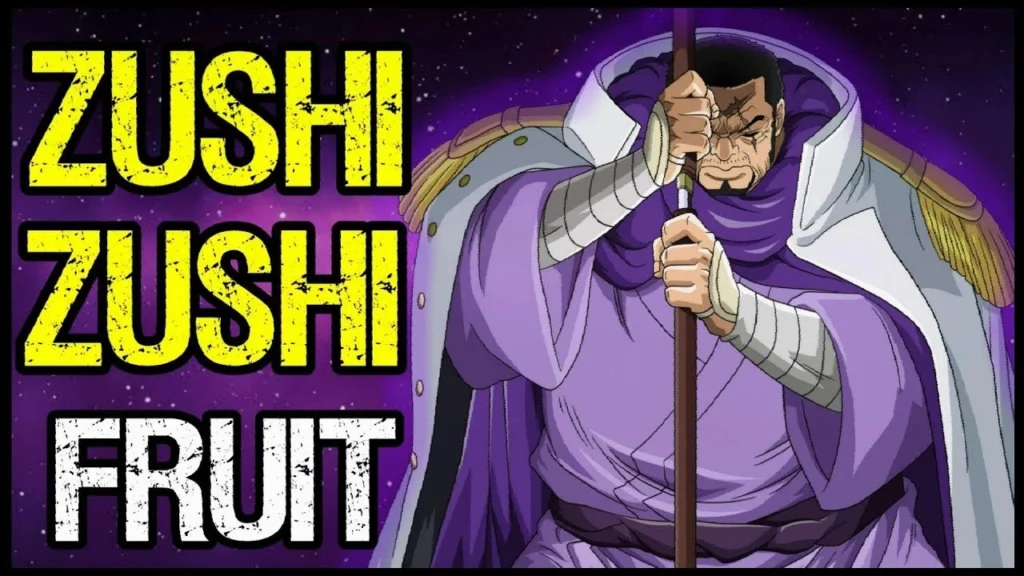
Fujitora’s mastery of the Zushi Zushi no Mi gives him a variety of abilities, including the ability to create powerful gravitational fields capable of crushing opponents or deflecting incoming attacks. He can also float objects, including entire islands, demonstrating his mastery of gravity. This makes him a formidable opponent in any confrontation, as his abilities can easily outclass even the most skilled adversaries.
Despite the immense power of his Devil Fruit abilities, Fujitora approaches combat with discipline and strategy. He uses his abilities with precision and restraint, only releasing their full potential when necessary. This demonstrates his ability as a tactician and martial artist, as he can adapt his fighting style to any situation.
b. Proficient in both Busoshoku and Kenbunshoku Haki
In addition to his formidable Devil Fruit abilities, Fujitora is an expert in the use of Haki, a mysterious energy that can be used for a variety of purposes in combat. He has demonstrated proficiency in both Busoshoku Haki (Armament Haki) and Kenbunshoku Haki (Observation Haki).
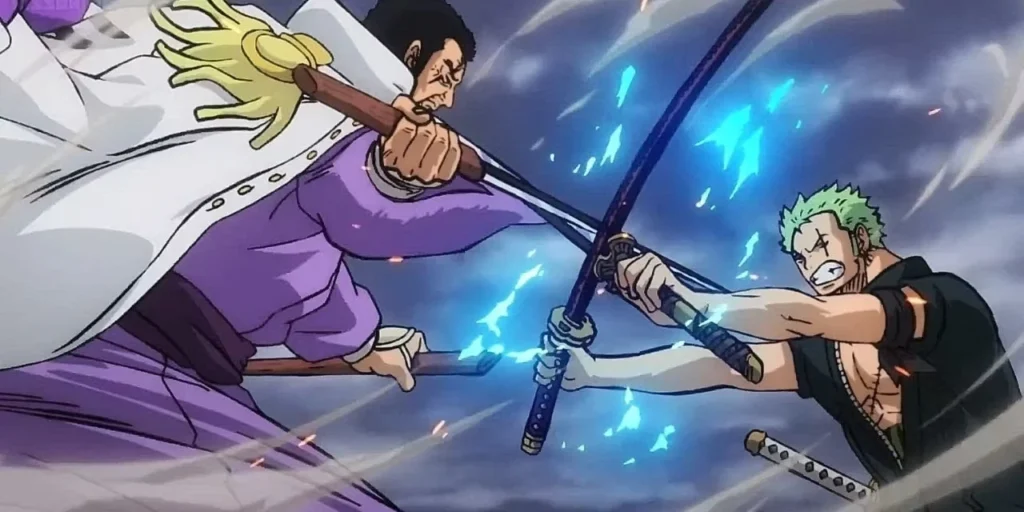
Busoshoku Haki enables Fujitora to inject his attacks with invisible armor, increasing their power and allowing him to avoid even the most powerful opponents’ defenses. This makes his attacks extremely powerful, capable of dealing significant damage even to opponents with Devil Fruit abilities or other enhanced defenses. Furthermore, Busoshoku Haki enables Fujitora to bypass Logia-type Devil Fruit intangibility, allowing him to harm even those who can transform their bodies into elemental substances.
Kenbunshoku Haki, on the other hand, improves Fujitora’s senses and perception, allowing him to anticipate his opponent’s movements and react with pinpoint accuracy. This gives him a significant advantage in combat, allowing him to anticipate and effectively counter his opponent’s actions. Fujitora’s mastery of Kenbunshoku Haki allows him to easily evade attacks while remaining aware of his surroundings even during chaotic battles.
Fujitora’s Devil Fruit abilities, combined with his mastery of Haki, allow him to unleash devastating attacks and outmaneuver his opponents. His proficiency in both forms of Haki demonstrates his martial artistry and solidifies his reputation as one of the most formidable fighters in the One Piece universe.
History
a. Born 54 years ago in the Grand Line, Fujitora blinded himself after witnessing numerous atrocities
Fujitora’s roots go back to the unstable and perilous waters of the Grand Line, where he was born half a century ago. Raised in the chaos and lawlessness of the pirate-infested seas, his early life was shaped by the harsh realities of his surroundings. Fujitora’s path was set against the backdrop of violence and injustice.
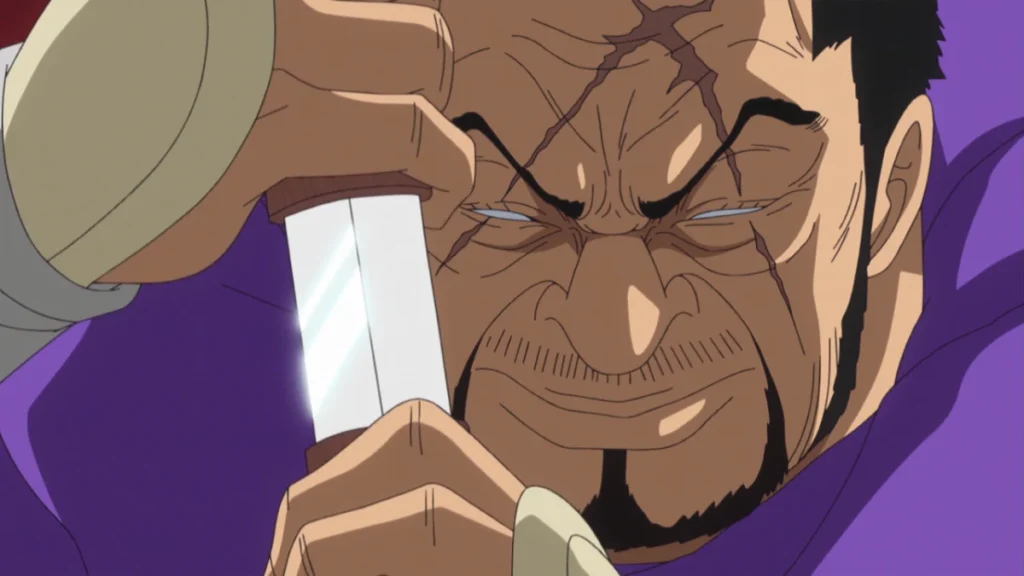
Fujitora witnessed numerous atrocities committed by pirates and criminals as a child, and their actions had a profound impact on his soul. The horrors he witnessed instilled in him a fierce determination to combat evil and bring justice in any way he could. However, it was a fateful decision that would permanently alter the course of his life.
Fujitora decided to blind himself in order to pay for his past sins and symbolize his commitment to justice. By giving up his sight, he hoped to remove the distractions of the physical world and sharpen his focus on the pursuit of righteousness. This self-imposed blindness was not only a testament to his unwavering determination, but also a constant reminder of the atrocities he had witnessed.
Thus, with his vision obscured but his sense of justice unwavering, Fujitora set out on a journey that would lead him to the ranks of the Marines and, eventually, to the position of Admiral. His decision to blind himself demonstrates his unwavering commitment to justice and serves as a watershed moment in his illustrious history.
b. He joined the Marines through the World Military Draft and was quickly promoted to Admiral
Fujitora’s exceptional dedication and combat prowess drew the attention of his superiors shortly after he joined the Marines via the World Military Draft. Despite his late entry into the organization, his unwavering dedication to justice and extraordinary abilities propelled him quickly through the ranks.
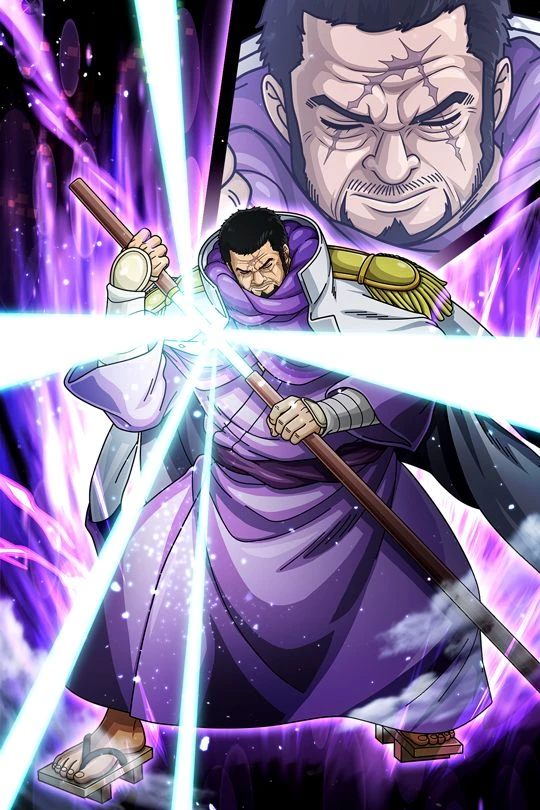
Fujitora’s meteoric rise within the Marine Corps comes to climax in his appointment as one of three Admirals, the organization’s highest-ranking officers. This rapid promotion demonstrates his abilities and the confidence placed in him by his fellow Marines.
Fujitora took on enormous responsibility as Admiral, tasked with upholding justice and maintaining order on the Grand Line’s stormy seas. His promotion to this prestigious position signaled the start of a new chapter in his life, one in which he would play a critical role in shaping the course of history.
Despite his newfound authority, Fujitora remained committed to his principles, never losing sight of the ideals that inspired him to join the Marines in the first place. His appointment as Admiral validated his unwavering commitment to justice and the protection of the innocent.
Throughout his career as an admiral, Fujitora distinguished himself through his actions, earning the respect and admiration of both allies and adversaries. His rise from humble recruit to one of the Marine Corps’ most formidable figures demonstrates his unwavering spirit and resolve.
c. Fujitora campaigned for the abolition of the Seven Warlords of the Sea system and actively participated in missions related to Doflamingo and Dressrosa
One of Fujitora’s most notable actions as Admiral was his strong support for the dismantling of the Seven Warlords of the Sea system. Recognizing the inherent flaws and dangers of granting amnesty to notorious pirates in exchange for their services, Fujitora took a brave stand against this antiquated institution.
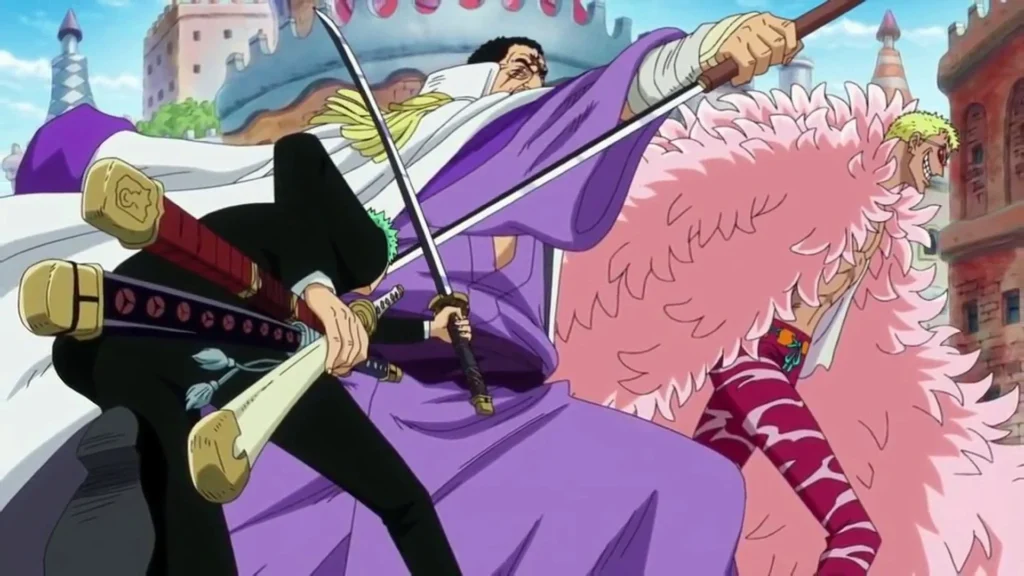
Fujitora led a campaign to abolish the Warlord system, motivated by his unwavering commitment to justice and belief in holding all criminals accountable for their actions. He contended that relying on pirates to keep order only sustain lawlessness and undermined the Marines’ authority.
Fujitora’s campaign against the Warlords was more than just a theoretical debate; he actively carried out missions against these former pirates turned government allies. One such mission landed him in the thick of the Dressrosa conflict, where he played a key role in confronting Warlord Donquixote Doflamingo.
Fujitora’s actions during the Dressrosa Arc echoed around the world as he clashed with Doflamingo and his underlings in an attempt to bring the warlord to justice. As he faced one of the most powerful figures in the pirate world, he demonstrated his unwavering resolve and formidable combat skills.
Fujitora’s participation in the Dressrosa conflict demonstrated his willingness to confront corruption and uphold justice, regardless of the personal risks involved. His actions served as a rallying cry for those who supported his vision of a world free of pirates and criminals.
Despite facing formidable opposition and setbacks along the way, Fujitora persisted in his quest to abolish the Warlord system. His unwavering determination and commitment to justice continue to inspire others in the Marine Corps and beyond.
Levely Arc
Fujitora, also known as Issho, appears prominently in the Levely Arc of the One Piece storyline, demonstrating his dedication to justice and willingness to engage in global issues.
a. Fujitora attended the Levely and expressed interest in Vegapunk’s inventions, suggesting potential changes to the Warlord system
During the Levely, a gathering of world leaders and royalty from various nations in the One Piece universe, Fujitora expressed his concerns about the Seven Warlords of the Sea system. This system, which allows powerful pirates to act as plunderer for the World Government in exchange for specific benefits, has long been a source of dispute in the One Piece universe.
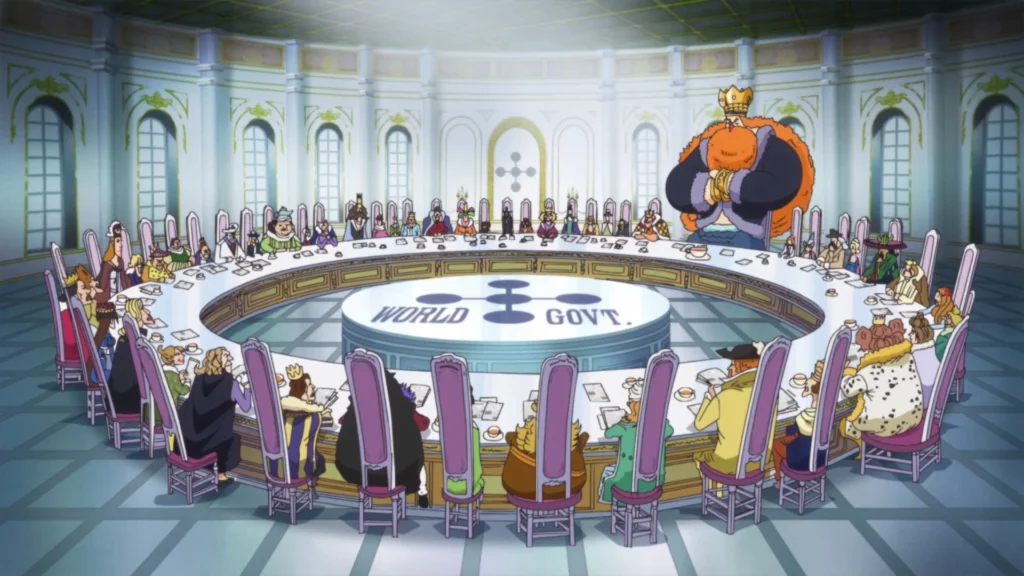
Fujitora’s interest in Vegapunk’s inventions is noteworthy because Vegapunk is renowned as a brilliant scientist who has made groundbreaking advances in a variety of fields, including weaponry and technology. Fujitora’s interest in Vegapunk’s inventions suggests that he sees potential for using technology to address issues within the Warlord system, which could imply reforms or even abolition.
This demonstrates Fujitora’s proactive approach to addressing systemic issues in One Piece. Rather than passively accepting the status quo, he actively seeks solutions and opportunities for improvement, even if it means questioning established norms and structures.
Fujitora’s participation at the Levely demonstrates his commitment to his principles and willingness to engage in diplomatic and political processes, despite his position as a Marine Admiral. It also emphasizes his role as a key figure in shaping the future of the One Piece universe, as he strives to effect meaningful change for the betterment of society.
Conclusion
Fujitora, also known as Issho, emerges as a complex and principled character in the One Piece universe. His introduction during the post-timeskip period mark the start of a new era of Marine leadership, distinguished by his commitment to “Human Justice” and his unwavering pursuit of eradicating evil and corruption within both the Marines and the World Government. Despite his blindness, Fujitora has remarkable combat abilities, relying on his gravity-based Devil Fruit powers and Haki mastery to exact justice without causing unnecessary collateral damage.
Fujitora’s actions and interactions with various characters throughout his career as an Admiral demonstrate his nice personality and strong moral compass. His opposition to the Seven Warlords of the Sea system, conflicts with notorious pirates such as Doflamingo, and willingness to challenge the status quo at the Levely show his dedication to upholding justice and making the world a safer place for everyone.
In conclusion, Fujitora’s character is an engaging addition to the One Piece story, expressing themes of redemption, responsibility, and the pursuit of a just society. His career as a Marine Admiral is far from over, with more opportunities to develop and explore his principles and convictions in the face of adversity.
FAQs
Q1. What motivated Fujitora to join the Marines and rise to the rank of Admiral?
A. Fujitora joined the Marines after witnessing numerous atrocities, which led him to seek justice and protect innocent people. His rapid rise to the rank of Admiral was likely due to his dedication, combat prowess, and adherence to his principles of justice.
Q2. How does Fujitora’s “Humane Justice” philosophy influence his actions within the Marines and towards pirates?
A. Fujitora’s “Humane Justice” philosophy prioritizes protecting people and preventing misfortune. This influences his actions within the Marines by guiding him to root out corruption and eliminate evil, even if it means defying orders or challenging established systems. Towards pirates, he acknowledges good deeds and intentions but remains vigilant against their potential for harm.
Q3. Can you explain Fujitora’s relationship with other notable characters like Fleet Admiral Sakazuki and Doflamingo?
A. Fujitora maintains a complex relationship with Fleet Admiral Sakazuki, as they share conflicting values but also respect each other’s abilities. He distrusts Doflamingo due to his illegal activities and conflicts with the Marines, engaging in direct confrontations with him during missions related to Dressrosa.
Q4. What are the abilities granted to Fujitora by the Zushi Zushi no Mi Devil Fruit, and how does he utilize them in combat?
A. The Zushi Zushi no Mi Devil Fruit grants Fujitora control over gravity. He can increase gravity’s pressure, create gravitational fields, and summon meteorites. In combat, Fujitora uses these abilities to devastating effect, manipulating the battlefield and overpowering his opponents with gravitational forces.
Q5. How does Fujitora’s presence at the Levely tie into his goals and actions regarding the abolition of the Seven Warlords of the Sea system?
A. Fujitora’s attendance at the Levely suggests his interest in advocating for changes to the Warlord system. His actions and proposals during the event likely aim to gather support for the abolition of the system, reflecting his long-standing campaign against the perceived injustices and dangers posed by the Seven Warlords.
Q6. Could you elaborate on Fujitora’s history, particularly regarding his self-inflicted blindness and his stance against atrocities?
A. Fujitora, born 54 years ago in the Grand Line, blinded himself after witnessing numerous atrocities, a symbolic act representing his refusal to turn a blind eye to injustice. This traumatic event likely fueled his determination to join the Marines and combat evil, shaping his “Humane Justice” philosophy and guiding his actions throughout his career.
